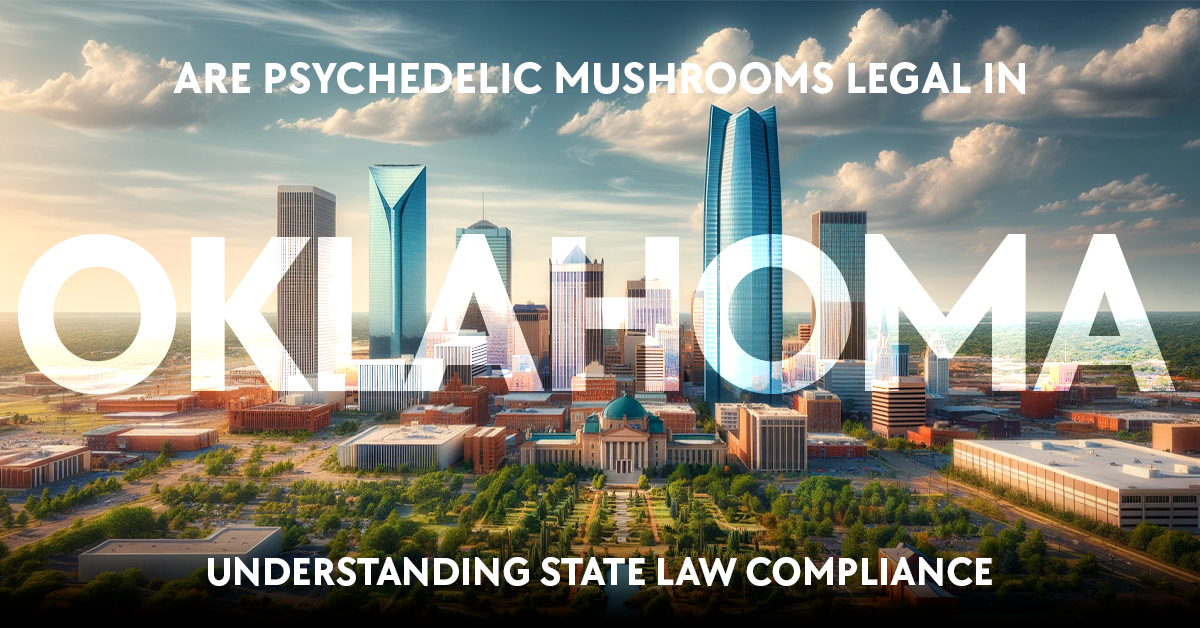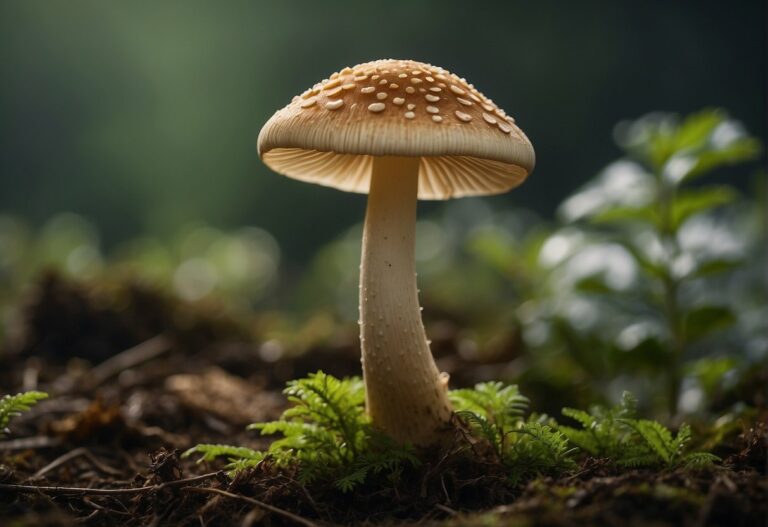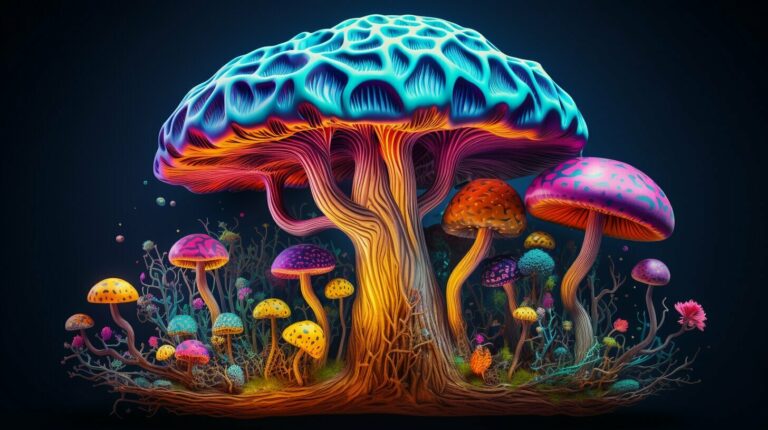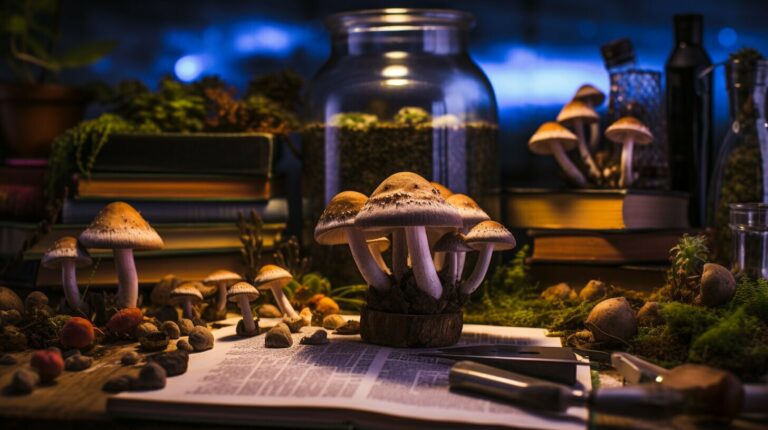As you explore the legal landscape of psychedelic mushrooms in Oklahoma, it’s important to understand the intricacies of local and federal laws. In the United States, psilocybin, the psychoactive compound found in psychedelic mushrooms, is classified as a Schedule I controlled substance. This means that at the federal level, the cultivation, distribution, and possession of psilocybin mushrooms are illegal due to the potential for abuse and a lack of accepted medical use. However, legal approaches to psychedelics have been evolving, and certain states and cities have begun to reevaluate their stance on these substances.

Within Oklahoma, state law aligns with federal regulations, deeming psychedelic mushrooms as illegal. Possession, sale, or cultivation can lead to significant legal consequences, including fines and imprisonment. While discussions around the medical and therapeutic benefits of psilocybin continue to gain traction, any changes to the legal status of psychedelic mushrooms would require action from state legislators or new rulings in the legal system.
Recent legal developments indicate a growing interest in the therapeutic potential of psychedelics. For example, certain jurisdictions have initiated programs to research the medical benefits of psilocybin, potentially paving the way for future legal reclassifications. Nonetheless, until such changes are made, the possession and use of psychedelic mushrooms remain against the law in Oklahoma.
Legal Landscape of Psychedelic Mushrooms in Oklahoma
Table of Contents
https://www.youtube.com/watch?v=jh6frZRQ8Wk&embed=true
The legal landscape regarding psychedelic mushrooms in Oklahoma remains stringent, and your understanding of the laws can help navigate the complexities surrounding their use and possession.
Current State Laws and Penalties
In Oklahoma, the possession of psychedelic mushrooms, which contain psilocybin, is illegal. If you are caught with these substances, the consequences are serious. Possession of any amount is deemed a misdemeanor, but can escalate to a felony depending on the quantity and intent (such as distribution or manufacturing). Penalties may include:
- Misdemeanor: Up to one year in jail
- Felony: Minimum of two years and up to life in prison
Moreover, fines can be hefty, potentially reaching thousands of dollars, reinforcing Oklahoma’s tough stance against controlled substances deemed illegal by state law.
Possession and Decriminalization Efforts
Recent shifts in perception have led to efforts to decriminalize drug offenses, including those for psychedelic mushrooms. However, in Oklahoma, there has been no legislation passed to decriminalize the possession of psychedelic mushrooms. As of now, House Bill 3414 or similar legislation seeking to reform laws on psilocybin has not been enacted.
While there is a growing movement in some states to relax laws concerning psychedelics, in Oklahoma, the legalization for medical or recreational use remains a distant reality. It’s essential you stay aware of these legal boundaries and the ongoing political discourse, as changes can impact legal outcomes significantly.
Medical and Therapeutic Potential

Your curiosity about the legalization of psychedelic mushrooms in Oklahoma may stem from their emerging medicinal potential. Psychedelics like psilocybin are being studied for their possible benefits in treating various mental health conditions.
Research on Psilocybin and Mental Health
Recent studies have highlighted psilocybin, the active compound in psychedelic mushrooms, for its potential to manage depression and anxiety. Research centers are looking into psilocybin’s ability to create lasting positive changes in brain chemistry and psychological well-being. A notable example includes a study suggesting that psilocybin therapy could lead to significant improvements in emotional and existential distress.
Psychedelics in Clinical Trials and FDA Status
Psychedelics such as psilocybin are categorized as Schedule 1 drugs under U.S. federal law, indicating a high potential for abuse and no currently accepted medical use. However, clinical trials have been sanctioned to explore their therapeutic potential, leading the FDA to grant psilocybin breakthrough therapy designation for depression. This facilitates faster development and review of the drug for medicinal use, acknowledging the severity of the unmet medical need.
Treatment for PTSD and Other Conditions
Beyond depression and anxiety, psilocybin research is particularly poignant for its application in treating PTSD, showing promise for veterans and others who have experienced traumatic events. In controlled environments, psilocybin-assisted therapy has begun to show efficacy in reducing symptoms of post-traumatic stress disorder. Additionally, its use extends to aiding those with addiction and existential anxiety related to serious illness, offering new hope where traditional treatments fall short.
Cultural and Social Considerations
In Oklahoma, the legal landscape surrounding psychedelic mushrooms has both cultural nuances and social impacts that you should be aware of, as these factors influence perceptions and the evolving conversation around these psychoactive substances.

Public Perception and Societal Impact
Public perception of psychedelic mushrooms, often referred to as “magic mushrooms” or “shrooms,” varies widely across Oklahoma. While some view these psychoactive compounds as potential public service tools for mental health treatment, others remain skeptical about their safety and legality. The societal impact of psychedelics reaches into realms like healthcare, law enforcement, and creative culture. On one hand, the integration of psychedelics into health services highlights their therapeutic potential, yet the illegal status of substances like psilocybin – the psychoactive compound in magic mushrooms – continues to affect related policy discussions.
Historical Use and Modern Renaissance
The historical use of magic mushrooms stretches back to indigenous practices, where they held sacred status and were used in religious and healing ceremonies. Today, you’ll witness a modern renaissance as interest in the potential benefits of these psychedelic substances grows within the context of culture and health. This resurgence in popularity brings with it debates around cultural appropriation and the responsible integration of ancient knowledge within contemporary settings, reflecting a complex relationship between past and present.
Comparative Analysis

In this section, you’ll find a focused comparison of how psychedelic mushrooms are regulated in various states compared to Oklahoma and an examination of the interplay between federal and state policies.
Other States’ Approach to Psychedelic Mushrooms
Oregon leads the charge in the movement towards the decriminalization of psychedelic substances. In 2020, Oregon passed a measure making it the first state to both decriminalize the possession of small amounts of psychedelic mushrooms and allow their supervised use. Similarly, cities like Oakland and Denver have moved towards decriminalizing psilocybin, the active compound in psychedelic mushrooms. This stance is often compared to attitudes towards marijuana, which has seen a wave of decriminalization and legalization across various states, including California and Colorado.
Federal Government vs State Policies
The balance of power between the federal government and the states creates a complex legal landscape for substances like psychedelic mushrooms and LSD. Despite states like Oregon taking steps to reform their laws, at the federal level, psilocybin remains a Schedule I controlled substance. This classification puts it in the same legal category as heroin according to the United States Controlled Substances Act, indicating a high potential for abuse and no accepted medical use. Your understanding of the legality of these substances must take into account that state laws can only go so far, as the federal government holds overarching authority, and federal law prohibits the manufacture, distribution, or dispensation of psilocybin.
Future Prospects and Legislative Movement
As you seek to understand the legal landscape of psychedelic mushrooms in Oklahoma, it’s crucial to monitor the progression of active bills and the positions of lawmakers on this issue.
Active Bills and Lawmaker Stances
In the Oklahoma legislature, House Bill 2107 has been a focal point for discussions on the therapeutic potential of psilocybin, the active compound in psychedelic mushrooms. Introduced by Representative Daniel Pae, the bill reflects a pioneering effort to establish controlled environments for the use of psilocybin in treating certain medical conditions. This groundbreaking legislative move indicates a shift in perception by some Oklahoma lawmakers, considering the broader national conversation on psychedelic research and therapies.
Potential for Psychedelic Reforms in Oklahoma
Your attention to StateImpact Oklahoma could provide valuable insights into the developing narrative around psychedelic reform within the state. While there has been no direct endorsement or opposition from the governor’s office on the topic, the legislature’s response to public interest and advocacy actions could pave the way for significant policy changes. The outcomes of such bills and modifications within Oklahoma’s legal framework would be pivotal in shaping the future of psychedelic substance regulation within the state. Keep an eye on the legislature’s actions for the most current and accurate forecast of reforms in this area.
Practical Implications
Understanding the practical implications of the legal status of psychedelic mushrooms in Oklahoma is essential for navigating the current landscape. You will need to consider the statewide laws, the nuances of spore legality, and the potential for psychedelic mushrooms to influence mental health crisis interventions.
Access to Psychedelic Mushrooms and Spores
In Oklahoma, psychedelic mushrooms are illegal. This includes their use, possession, sale, and cultivation. However, a peculiarity in the law allows for the possession of magic mushroom spores, as they do not contain psilocybin, the psychoactive compound found in mature mushrooms. This has specific implications for you:
- Legal acquisition: You can obtain spores for research and educational purposes.
- Cultivation prohibition: Despite spore legality, turning them into mature mushrooms remains against the law.
Refer to Observations on 25 Years of Cannabis Law Reforms for a detailed analysis of similar policy evolutions.
Implications for Mental Health Crisis Response
Magic mushrooms have been decriminalized in some jurisdictions across the United States, leading to changes in mental health crisis response approaches. Oklahoma has not decriminalized these substances, but their potential for harm reduction in a clinical setting has been a topic of research. For you, this means:
- No decriminalized status: In Oklahoma, psilocybin remains illegal, limiting access for any clinical use for mental health crisis.
- Clinical research: While legal barriers exist, there is growing research support for psychedelic-assisted therapy, which could imply future changes to how mental health crises are managed.
For insights into the evolving legislation and research, consider the Legal Developments in Psychedelic Therapeutics article.
Related Legal and Health Entities
In understanding the legal and therapeutic landscape of psychedelic substances in Oklahoma, you need to be aware of the specific regulations that impact their use and the research contributions that support their potential benefits.
Comparing Psychedelic Substances
DMT and MDMA are psychedelic substances like psilocybin, the psychoactive compound in magic mushrooms. However, under Oklahoma law, all these substances are classified as Schedule I substances, meaning their possession or use is generally subject to a felony charge. It is crucial for you to recognize the importance of these classifications, as they indicate a high potential for abuse and no accepted medical use in the United States.
Research Contributions and Support
Substantial research supports the potential of psychedelics like psilocybin to treat mental illness—conditions such as treatment-resistant depression, obsessive-compulsive disorder, and others—by influencing serotonin receptors in the brain. This has spurred a nationwide conversation about the role of psychedelics in mental health treatment. Numerous public radio stations and harm reduction organizations have highlighted the profound contributions these substances could make in saving lives. However, even as some states explore this potential, in Oklahoma, these substances remain largely prohibited, and their use outside of approved research is illegal.
Frequently Asked Questions
Below you’ll find detailed answers regarding the legality of psilocybin mushrooms in Oklahoma, which will address your concerns about possession, medicinal use, legislative actions, penalties, and cultivation.
What is the current status of psilocybin mushroom legality in Oklahoma?
In Oklahoma, psilocybin mushrooms are classified as Schedule I controlled substances. This classification makes them illegal to possess, use, or distribute within the state without a license or exemption.
Can someone be prosecuted for possessing psychedelic mushrooms in Oklahoma?
Yes, you can be prosecuted for possessing psychedelic mushrooms in Oklahoma. They are recognized as illicit drugs and carrying them can result in legal repercussions.
Are there any medicinal or therapeutic exemptions for the use of psilocybin in Oklahoma?
As of the current laws, Oklahoma does not provide medicinal or therapeutic exemptions specifically for the use of psilocybin. Research on psilocybin’s therapeutic potential is ongoing, but it has not altered the legal status in the state.
Has there been recent legislative action regarding psychedelic mushrooms in the state?
Legislative actions fluctuate over time. For up-to-date information on recent legislative actions regarding psychedelic mushrooms, you should consult current state legislation records or a legal professional.
What are the penalties for the sale or distribution of psilocybin mushrooms in Oklahoma?
Penalties for the sale or distribution of psilocybin mushrooms in Oklahoma are severe and can include fines, probation, and incarceration, depending on the quantity and circumstances of the offense.
Does Oklahoma allow for the cultivation of psilocybin mushrooms for personal use?
No, Oklahoma does not allow the cultivation of psilocybin mushrooms for personal use. Cultivation of these mushrooms falls under the same legal restrictions as possession and distribution.







